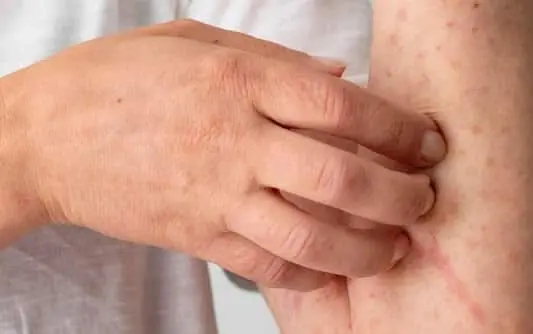Skin Allergy Reaction on Person’s Arm
What Are the Symptoms of Dermatitis?
The main symptom of dermatitis, or skin inflammation, is dry, red, itchy skin.
There are many types of dermatitis. Symptoms can vary depending on the type of dermatitis you have.
Contact Dermatitis Contact dermatitis, caused by exposure to an irritant or allergic reaction, typically shows up as a red, itchy rash that is limited to the area of skin exposed to the substance.
Nummular Dermatitis Nummular dermatitis, common in people who have dry skin or live in dry environments, shows up as red, itchy, circular patches of weeping, scaly, or crusted skin.
Seborrheic Dermatitis Seborrheic dermatitis, called cradle cap in infants, causes greasy, yellowish scales on the scalp and eyebrows, behind the ears, and around the nose.
Stasis Dermatitis Stasis dermatitis causes scaling, darkening, and swelling of the lower legs. Sometimes ulcerated or open skin appears inside the lower legs and around the ankles.
Atopic Dermatitis (Eczema) Atopic dermatitis (eczema) can cause extreme, persistent skin itchiness. However, many times, itchiness results simply from dry skin.
Contact our Granada Hills dermatology office about dermatitis if:
- Your skin has oozing sores, honey-yellow crusting, red, swollen, tender areas, or other signs of infection. You may need treatment with antibiotics or other drugs.
- The affected skin does not respond to treatment with over-the-counter creams or medicated shampoos. You should have a medical diagnosis and treatment.
- You are exposed to anyone with herpes simplex virus infection while you are having a flare-up of atopic dermatitis (eczema). You are at increased risk of contracting the viral disorder.
Recognizing the symptoms of dermatitis is crucial for prompt and effective management. Whether it’s the red, itchy rash of contact dermatitis, the circular patches of nummular dermatitis, the greasy scales of seborrheic dermatitis, or the lower leg issues associated with stasis dermatitis, understanding the signs allows for targeted intervention. Particularly in cases of atopic dermatitis (eczema), where persistent itchiness may indicate more than just dry skin, seeking professional help from our dermatologist is imperative. If you observe oozing sores, crusting, swelling, or signs of infection, or if over-the-counter remedies prove ineffective, don’t hesitate to contact our dermatology office. Timely intervention can make all the difference in managing and alleviating dermatitis symptoms effectively. Your skin’s health is our priority.


